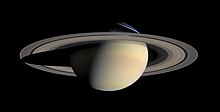Сатурн
Тас көрүҥэ
(Мантан: Буор сулус көстө)
 Сатурн, Cassini көрдөрүүтэ |
|||||||||||||||||||||
Designations
| |||||||||||||||||||||
|---|---|---|---|---|---|---|---|---|---|---|---|---|---|---|---|---|---|---|---|---|---|
| Adjective | Saturnian | ||||||||||||||||||||
| Epoch J2000 | |||||||||||||||||||||
| Aphelion | 1 513 325 783 km 10.115 958 04 AU |
||||||||||||||||||||
| Perihelion | 1 353 572 956 km 9.048 076 35 AU |
||||||||||||||||||||
| Semi-major axis | 1 433 449 370 km 9.582 017 20 AU |
||||||||||||||||||||
| Eccentricity | 0.055 723 219 | ||||||||||||||||||||
| Orbital period | 10 832.327 days 29.657 296 yr |
||||||||||||||||||||
| Synodic period | 378.09 days[3] | ||||||||||||||||||||
| Average orbital speed | 9.69 km/s[3] | ||||||||||||||||||||
| Mean anomaly | 320.346 750° | ||||||||||||||||||||
| Inclination | 2.485 240° 5.51° to Sun's equator |
||||||||||||||||||||
| Longitude of ascending node | 113.642 811° | ||||||||||||||||||||
| Argument of perihelion | 336.013 862° | ||||||||||||||||||||
| Satellites | ~ 200 observed (60 with secure orbits) | ||||||||||||||||||||
Физика кээмэйдэрэ
| |||||||||||||||||||||
| Equatorial radius | 60 268 ± 4 km[4][5] 9.4492 Earths |
||||||||||||||||||||
| Polar radius | 54 364 ± 10 km[4][5] 8.5521 Earths |
||||||||||||||||||||
| Flattening | 0.097 96 ± 0.000 18 | ||||||||||||||||||||
| Surface area | 4.27Халыып:E km²[6][5] 83.703 Earths |
||||||||||||||||||||
| Volume | 8.2713Халыып:E km³[3][5] 763.59 Earths |
||||||||||||||||||||
| Mass | 5.6846Халыып:E kg[3] 95.152 Earths |
||||||||||||||||||||
| Mean density | 0.687 g/cm³[3][5] (less than water) |
||||||||||||||||||||
| Equatorial surface gravity | 8.96 m/s²[3][5] 0.914 g |
||||||||||||||||||||
| Escape velocity | 35.5 km/s[3][5] | ||||||||||||||||||||
| Sidereal rotation period |
0.439 – 0.449 day[7] (10 h 32 – 47 min) |
||||||||||||||||||||
| Equatorial rotation velocity | 9.87 km/s[5] 35 500 km/h |
||||||||||||||||||||
| Axial tilt | 26.73°[3] | ||||||||||||||||||||
| North pole right ascension | 2 h 42 min 21 s 40.589°[4] |
||||||||||||||||||||
| North pole declination | 83.537°[4] | ||||||||||||||||||||
| Albedo | 0.342 (bond) 0.47 (geom.)[3] |
||||||||||||||||||||
| Surface temp. 1 bar level 0.1 bar |
| ||||||||||||||||||||
| Apparent magnitude | +1.2 to -0.24[8] | ||||||||||||||||||||
| Angular diameter | 14.5" — 20.1"[3] (excludes rings) |
||||||||||||||||||||
Атмосферата[3]
| |||||||||||||||||||||
| Scale height | 59.5 km | ||||||||||||||||||||
| Composition |
|
||||||||||||||||||||
Сатурн диэн Күнтэн алтыс уонна Күн систематыгар иккис (Юпитер кэнниттэн) планета. Гаас планеталар ахсааннарыгар киирэр.
| ||||||||||||||
- ↑ Yeomans, Donald K. HORIZONS System. NASA JPL (13 От ыйын 2006). Тургутулунна 8 Атырдьах ыйын 2007. — At the site, go to the "web interface" then select "Ephemeris Type: ELEMENTS", "Target Body: Saturn Barycenter" and "Center: Sun".
- ↑ Orbital elements refer to the barycenter of the Saturn system, and are the instantaneous osculating values at the precise J2000 epoch. Barycenter quantities are given because, in contrast to the planetary centre, they do not experience appreciable changes on a day-to-day basis from to the motion of the moons.
- ↑ 3,00 3,01 3,02 3,03 3,04 3,05 3,06 3,07 3,08 3,09 3,10 3,11 3,12 Williams, Dr. David R. Saturn Fact Sheet. NASA (September 7, 2006). Тургутулунна 31 От ыйын 2007.
- ↑ 4,0 4,1 4,2 4,3 Seidelmann, P. Kenneth; Archinal, B. A.; A’hearn, M. F.; et.al. (2007). «Report of the IAU/IAGWorking Group on cartographic coordinates and rotational elements: 2006». Celestial Mech. Dyn. Astr. 90: 155–180. DOI:10.1007/s10569-007-9072-y.
- ↑ 5,0 5,1 5,2 5,3 5,4 5,5 5,6 5,7 Refers to the level of 1 bar atmospheric pressure
- ↑ NASA: Solar System Exploration: Planets: Saturn: Facts & Figures
- ↑ Than, Ker Length of Saturn's Day Revised. Space.com (September 6, 2007). Тургутулунна 6 Балаҕан ыйын 2007.
- ↑ Schmude, Richard W Junior Wideband photoelectric magnitude measurements of Saturn in 2000. Georgia Journal of Science (2001). Тургутулунна 14 Алтынньы 2007.

